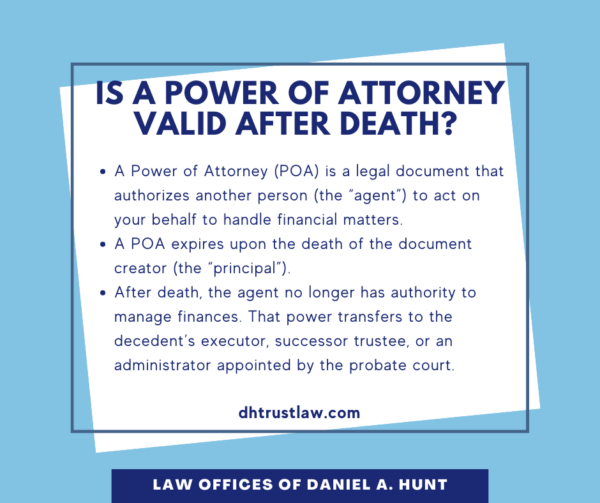Is a Power of Attorney Valid After Death?

A Power of Attorney (or POA) is a legal document that authorizes another person to act on your behalf to handle financial matters. When a person begins to lose mental or physical capacity, they may appoint someone they trust as their Power of Attorney agent to help perform financial tasks. But what happens when the document creator passes away? Is a Power of Attorney valid after death?
A Power of Attorney is Invalid After Death
A Power of Attorney expires upon the death of the document creator, who is called the “principal”. While a Durable POA remains valid if the principal becomes incapacitated, all Powers of Attorney become invalid once the holder dies.
After the Power of Attorney holder passes away, the agent will no longer have the ability to manage financial affairs such as accessing bank accounts and investments, paying bills, and handling real estate transactions.
This is why it’s critical for individuals to create a comprehensive estate plan that includes a will or trust while they still have the capacity to do so. After the principal’s death, their will or trust will control who is in charge of the estate assets.
Who Controls Finances After Death?
If the decedent’s Power of Attorney document is no longer valid, who controls their finances after death? The answer depends on whether the decedent created an estate plan and if so, what kind. Here are three possible options:
- If the decedent created a revocable living trust, the successor trustee named in that document would take control of the decedent’s trust assets. They can begin to collect assets as soon as they receive a death certificate.
- If the decedent created a will, the executor would need to file a petition with the probate court to open a probate. Once appointed by the court as the executor, they can begin to collect and manage the estate assets.
- If the decedent did not create an estate plan, an interested party (usually a family member) would need to file a petition with the probate court to open a probate and seek to be appointed as an administrator. Once the court appoints a personal representative for the estate, that person can begin to collect and manage the estate assets.
What If the Agent Continues Acting Post-Death?
If the agent intentionally continues using their Power of Attorney after the death of the holder, this could be an example of Power of Attorney abuse. An agent may steal from the estate by using their Power of Attorney after the holder’s death to transfer the decedent’s assets into their own name. Estate beneficiaries may not realize this has taken place until they discover missing assets during the trust or estate administration.
In these types of inheritance hijacking situations, beneficiaries should immediately seek the counsel of an experienced trust and estate litigation attorney. They can help you understand what steps to take to recover the stolen assets and restore your inheritance.
How to Ensure a Smooth Transition
If you only have a Power of Attorney and have not yet created a comprehensive estate plan, now is the time to seek the guidance of an experienced estate planning attorney. They can help you design an estate plan where all the different documents work together to ensure a smooth transition for your loved ones.
If you have any questions about Powers of Attorney, feel free to contact our office.
Law Offices of Daniel A. Hunt
The Law Offices of Daniel A. Hunt is a California law firm specializing in Estate Planning; Trust Administration & Litigation; Probate; and Conservatorships. We've helped over 10,000 clients find peace of mind. We serve clients throughout the greater Sacramento region and the state of California.




